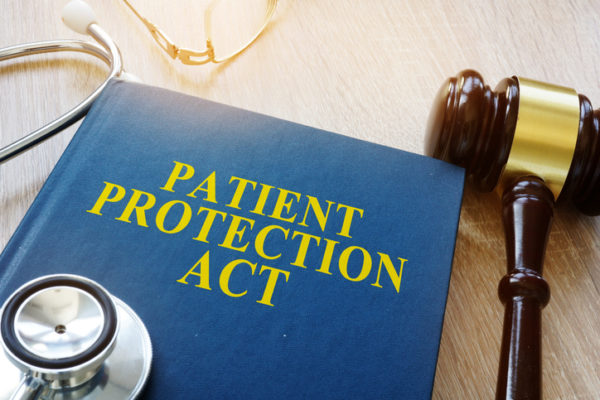Did you know your child becomes a legal stranger to you the minute he or she turns 18? Legal adulthood happens at 18 in most states. If there is an emergency medical situation, you have no more legal rights over him or her than over a stranger you never met or the 40-year-old friend who lives next door to you.
Because your college student child is now of legal age, protective laws restrict your right to information. This might seem fine until there is a medical emergency.
Welcome to A Parent’s Legal Nightmare Zone

A Car Accident is Terribly Frightening. But E.R. May Refuse to Release Information, Even to a Parent.
At Principal Law, we are spreading the word so that parents of children 18 and over become more aware of the privacy of medical records and the restrictions of “The Health Insurance Portability and Accountability Act (HIPAA). If you have a child in college, 18 years old or older, do not let the story below, as reported in “Consumer Report” happen to you.
A Mother’s Fears
“Early one October morning, Sheri E. Warsh, a mother of three from Highland Park, Ill., stepped out of the shower to a ringing phone. On the other end, her 18-year-old son’s college roommate delivered the terrifying news: Her son—270 miles away at the University of Michigan—was being rushed by ambulance to a nearby emergency room with severe, unrelenting chest pain. “I was scared out of my mind, imagining the worst,” Warsh said.
In a panic, she called the ER for details about the medical emergency. What she got instead was a rebuff from the nurse. “She asked me how old my son was. And when I said 18, she told me I had no right to talk to the doctor.”
The Legal Translation of the ER Nurse’s Behavior
By law, the nurse was acting in her patient’s best interest. And according to HIPAA, a hospital must protect the patient’s privacy, even if a half-hysterical mother is on the phone from 270 miles away.
Attention Mom and Dad: Some Major Legal Points to Ponder
HIPAA protects the privacy of all your adult child’s medical records. Did you know that this includes your student’s visits to the college health centers?
- Did you know this protection also extends to any and counseling or mental centers attended by your son or daughter?
- Do you understand it also means your college child can return to his or her family doctor back at home, and the records will be totally confidential?
- Likewise, if a serious new health issue arises, you will be kept in the dark about it unless invited by your student. That student is now an adult in the eyes of the law
- At Principal Law we want you to know that this law still protects your child, even if you tell the nurse that you or your insurance company are still paying the health or hospital bills.
- All of your son or daughter’s health affairs are now confidential, just as yours are. All are protected from prying eyes, just as the law protects your records.
What to do After a Legal Talk with Your Adult Child: The Law Comes to the Rescue:

Do You Have the Legal Documents to Protect You and Your Child’s Rights?
So, at Principal Law, we feel it is a good idea to have an honest discussion about these issues your adult child before he or she leaves for college or other pursuits at age 18.
We have handled many of this type of case and we at Principal Law know that lack of understanding HIPAA law can cause a great deal of distress in an emergency, as it did for Ms. Warsh in the example story. There’s a Form for That!
Visit the Principal Law Firm
We also invite you to visit Shivon’s office to discuss details about HIPAA or any other legal paperwork your adult child or you might need. And when you know your plans as adult parents and children, we also want you to realize there is a legal form which you and your adult child can customize in accordance with their wishes. Read more about these issues in the New York Times.
Remember, “They have the right to limit all or parts of their medical life.” See the example of a generic form of this type of document at this reliable online resource.
Other sources where you can find such a form include your family doctor’s office or your adult student’s official college website. Typically, the form includes a space where the student can state the types of information which they prefer to keep confidential. For example, they might want to keep their medical issues involving sex confidential.
A Happy HIPAA Form for Parents: Don’t Leave Home Without It!
The form will permit health-care providers to share information with you.
- If your child’s college is out of state, we recommend that you fill out a form for both your home state and the state in which the college is located.
- We also recommend that you and your student retain hard copies plus put convenient scans of the documents in your smartphones, laptops or desktop computers. By the way, in an emergency situation without paperwork, you do have more power in person than you do on the phone.
Experts tell us, “The safety and care of a patient trump HIPAA. So in the E.R., if a patient is unable to communicate, doctors can use their own judgment about sharing information with family members who are present.”
Phone Calls May Not Get the Response You Need

The Hospital Will Protect Their Rights. Will You?
Experts at Principal Law Can Help.
However, you should know, as a parent of an adult, the E.R. will probably respond differently to a phone call. The person answering the phone probably will not be able to confirm for you that your child, a college-aged student is a patient at the hospital.
There is more to this story than one blog can cover. And if you are the parent of an 18-year-old child, you probably want to know more about how you can wrap your child in the best legal protection available. You won’t want to miss our next blog. It includes coverage of more legal documents your college-bound child should probably not leave home without. Of course, it includes reading and probably signing.
Thank you for reading this week’s Principal Law blog. Perhaps a tad early, let us be the first to wish you a safe, secure, and happy Independence Day. Happy July the Fourth!



